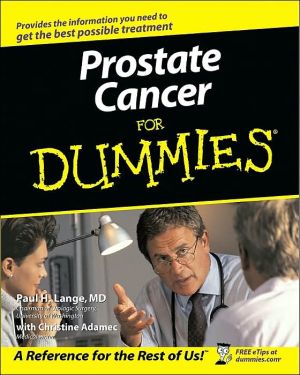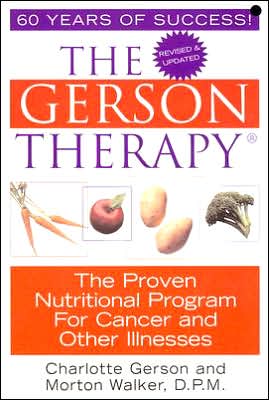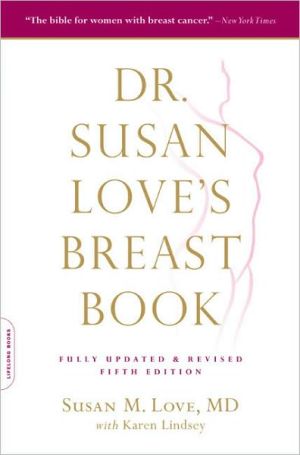Prostate Cancer for Dummies
Hearing that you have prostate cancer, or even that you may have it, is very scary. But this disease, in many cases, is curable. Even if you have advanced cancer that's spread beyond the prostate, many treatments help extend your life for years. You need good information to help you with the decisions that lie ahead, and this book provides you with this information.\ Prostate Cancer For Dummies can help you if\ \ You have prostate cancer (or you think that you have it), or someone close to...
Search in google:
Hearing that you have prostate cancer, or even that you may have it, is very scary. But this disease, in many cases, is curable. Even if you have advanced cancer that's spread beyond the prostate, many treatments help extend your life for years. You need good information to help you with the decisions that lie ahead, and this book provides you with this information. Prostate Cancer For Dummies can help you if You have prostate cancer (or you think that you have it), or someone close to you has it. You want information on treatments for prostate cancer as you form a treatment plan with your doctor. You are curious about alternative therapies for prostate cancer. You want to know what actions you can take over the long-term to continue to fight your prostate cancer. Prostate Cancer For Dummies explains the key issues and problems that are associated with prostate cancer, and assures you that although the initial impact of being diagnosed is devastating, you can take action to extend your life. You don't have to read this book from the first page straight on through, although you can. You may want to read the first chapter and then move to the chapters that affect you the most. In Prostate Cancer For Dummies, you'll gain insight into Discovering the key symptoms of prostate cancer Recognizing the risk factors, and who's most likely to have prostate cancer Getting a diagnosis, and what's involved Getting well again, and how you can work with your doctor to come up with a plan to cope with your cancer Changing your lifestyle to decrease your risk of a recurrence Coping with theaftermath, from temporary to permanent side effects Handling work and family, and how to help others understand what you're going through It's extremely hard to hear from your doctor that you or a loved one has prostate cancer. But after you recover from the initial shock of diagnosis, you need to educate yourself, and, with the help of your physician, make a plan for getting the best treatment possible. Prostate Cancer For Dummies will help you achieve these goals and encourage you to maintain your commitment to managing your health.
Introduction1About This Book1Conventions Used in This Book2Foolish Assumptions2How This Book Is Organized3Icons Used in This Book6Where to Go from Here6Part IProstate Cancer: What It Is and Is Not7Chapter 1Identifying Basic Realities of Prostate Cancer9Understanding What Prostate Cancer Is and Who's at Risk10Identifying Prostate Cancer Impostors10Working with Your Physicians11Dealing with the Effects of Your Cancer, at Work and at Home16Chapter 2Understanding the Prostate Gland and Recognizing Cancer Symptoms17Zeroing In on Your Prostate18When Good Prostates Go Bad: Symptoms That May Occur23Chapter 3Investigating Who's at Risk for Prostate Cancer25Aging Matters26Regarding Racial Risks27Identifying Your Genetic Risks: Tracing Your Family (Cancer) Tree28Considering Other Factors that May Put You at Risk30Possibly Linking Prostate Cancer to Vietnam War Veterans31Chapter 4Identifying Diseases That May Mimic Prostate Cancer33Dealing with Benign Prostatic Hyperplasia34The Inflamed Prostate: Prostatitis39Looking at Bladder Infections42Regarding Other Possibilities44Part IIGetting a Diagnosis47Chapter 5Working with Your Doctor to Detect Prostate Cancer49Reporting Your Medical History to Your Doctor50The Digital Rectal Exam: You Can Get Through It53Pondering the PSA56Looking at Other Lab Work58Keeping in Touch with Your PCP59If Cancer Isn't Found60Chapter 6Diagnosing and Treating Prostate Cancer with the Help of Specialists61Getting the Gist of Urologists and Oncologists61Finding a Good Specialist63What's Up, Doc? Questions to Ask When Considering a Specialist67Talking Effectively with Your Specialist68Testing, Testing! Important Tests the Specialist May Order69Chapter 7Understanding the Biopsy73So What Is a Prostate Biopsy, Anyway?73Understanding Information Biopsies Can Provide74Looking at How Biopsies Are Performed75Preparing for and Having a Biopsy76Understanding the Biopsy Report79Chapter 8Staging and Grading the Cancer83Staging and Grading Basics83Making the Grade with the Gleason Score84Staging with the TNM System88Grouping Stage, Grade, and PSA Together93Part IIIGetting to Wellness: Treating Prostate Cancer95Chapter 9Making a Treatment Plan97Considering Your Own Personal Situation98Analyzing Your Doctor's Recommendations100Thinking about Short-and Long-Term Plans100Planning Treatment for Localized Cancer102Pondering the Options for Advanced Cancer107Chapter 10Mastering Your Fears111Fear and Frustration Are Normal--It's How You Handle Them that Counts112Dealing with the "D" Word: The Fear of Death112Coping with Fears of Impotence114Dealing with Fears of Urinary Incontinence116Fearing Infertility116Worrying about Change at Work and Home117Seeking Support from Support Groups119Chapter 11Prostatectomy: A Mainstay Treatment for Prostate Cancer123Defining Radical Prostatectomy124Understanding the Reasoning Behind Your Doctor's Recommendation125Deciding If Surgery Is Right for You126Basic Info on the Prostatectomy Procedures130Scheduling and Preparing for Surgery136Recovering from Surgery139When Surgery Isn't Enough144Chapter 12Destroying the Cancer with Radiation Therapy147Defining Radiation147Understanding the Reasoning Behind Your Doctor's Recommendation149Deciding If Radiation Is Right for You150Basic Info on Radiation Procedures154Chapter 13Slowing the Cancer with Hormones163Basic Info on Hormone Therapy164Understanding Your Doctor's Recommendation169Deciding If Hormone Therapy Is Right for You170Preparing for Hormone Therapy174Pondering Treatment for Patients with Initially Advanced or Resistant Cancer174Chapter 14Considering Cutting-edge Treatments177Icing the Cancer: Cryosurgery177Turning Up the Heat: Microwave Therapy180Looking at Gene Therapy and Immune Therapy181Evaluating Experimental Drug Therapy183Joining Clinical Studies184Chapter 15Treating Very Advanced Cancer185Looking at Your Treatment Options185Managing Difficult Symptoms and Side Effects189Part IVChanging Your Lifestyle to Combat Prostate Cancer193Chapter 16Stress-busting When You Need It Most195Easing Stress with Relaxation Therapy196Pulsing Down with Biofeedback199Looking Into Your Eyes: Understanding Hypnotherapy200Pondering Meditation and Prayer201Battling Depression202Benefiting from Counseling203Chapter 17Working on a Healthy Lifestyle207Benefiting from Exercise207Dropping a Few Pounds209Doing Away with Unhealthy Habits211Chapter 18Alternative Remedies217Weighing the Pros and Cons218Considering Vitamin E and Selenium219Fighting Prostate Cancer with Your Diet223Checking Out Other Alternative Remedies225Easing Treatment Side Effects with Alternative Remedies226Part VCoping with the Aftermath Effects of Prostate Cancer229Chapter 19Resolving Erectile Problems231Considering Causes of Erectile Dysfunction232Finding Natural Ways to Improve Your Love Life234Uplifting Experiences: Devices That May Help235Happily Ever After with Viagra and Other Medications237Considering Penile Implant Surgery241Chapter 20Dealing with Urinary Incontinence247Identifying Incontinence247Padding the Problem251Drying Out: Working on Solutions252Chapter 21What to Do When Treatment Doesn't Wipe Out Cancer259Recognizing the Signs of a Recurrence260Don't Panic, Work with Your Doctor262Evaluating Your Treatment Choices263Part VIHandling Work and Family269Chapter 22Coping with Cancer on the Job271Explaining Prostate Cancer to Your Boss and Co-Workers272Identifying Laws that Cover Serious Illness273Thinking about Applying for Short- or Long-term Disability275Checking Out the Social Security Disability277Chapter 23Helping Friends and Family Understand Prostate Cancer283Explaining Your Illness284Dealing with Your Partner's Reactions285Explaining Cancer to Your Kids289Chapter 24Helping a Loved One Cope with Prostate Cancer295Dealing with Your Own Fears and Emotions296Comforting Your Loved One297Advice for Wives and Significant Others300Part VIIThe Part of Tens309Chapter 25Ten Myths and Realities about Prostate Cancer311Myth #1Prostate Cancer Is Solely an Elderly Man's Disease311Myth #2If You Have Cancer, You'll Know Because of the Symptoms312Myth #3When Diagnosed With Prostate Cancer, Death Is Inevitable312Myth #4Nobody Dies of Prostate Cancer312Myth #5You Caused Your Cancer313Myth #6Surgery or Radiation Is Always Best313Myth #7You'll Become Permanently Disabled313Myth #8Impotence Always Follows Treatment314Myth #9Prostate Cancer Always Makes Men Incontinent314Myth #10Your Partner Will Dump You315Chapter 26Ten Must-do's for Everyone Battling Prostate Cancer317Locate a Good Doctor You Can Trust317Tell Your Loved Ones (At Least Your Partner) About Your Cancer318Consider Bringing Someone to Your Doctor Visits318Ask Your Doctor Questions318Adopting a Healthy Lifestyle319Consider Different Treatment Options319Get a Second Opinion on Treatment, but Don't Endlessly Search319When You Decide on a Treatment, Don't Delay Needlessly320Research Prostate Cancer320Talk to Others Who Have Prostate Cancer321Chapter 27Ten Ways to Beat the Blues323Enjoying Activities with Your Family323Realizing that Prostate Cancer Is Highly Treatable324Praying Helps324During Treatment, Imagine Cancer Cells Dying324Getting Out of the House Can Life Your Spirits325Exercising Can Infuse You with Energy325Accept that Having Cancer Is Undeniably Tough325Reuniting with an Old Friend or Family Member326Participating in Activities You Enjoy326Considering Therapy When Depression Overwhelms You326Appendix AGlossary327Appendix BResources333Finding Support in Organizations and Support Groups333Utilizing the Web334Web sites334E-mail lists334Newsgroups335Online newsletters335Index337








